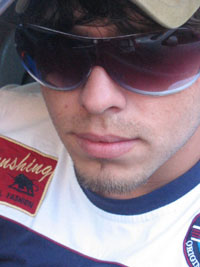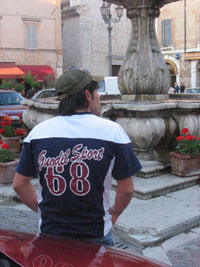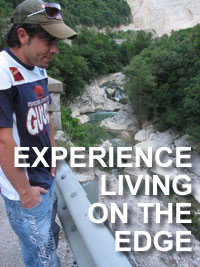By Jesse Herwitz
At 11, Valdrin “Drino” Hajdinocei, had to grow up quickly on the streets of Albania. One afternoon, while he was playing soccer, a fight began on the opposite end of the  field. Shkelzen, Drino’s closest friend, watched as his brother was attacked by a gang of youths. As Shkelzen approached, one of the boys pulled out a pistol, pointed it at his head and squeezed the trigger. field. Shkelzen, Drino’s closest friend, watched as his brother was attacked by a gang of youths. As Shkelzen approached, one of the boys pulled out a pistol, pointed it at his head and squeezed the trigger.
“He died innocent,” says Drino. “We knew each other since we were kids. He was just trying to stop the fight. After that I always carried a gun with me.”
Today, a decade later, Drino recalls the story, sipping an espresso, in the tranquility of a small town in Italy. He sits comfortably at a table. The bells from the Municipal Building ring and Drino’s long, brown hair sways as he turns his head to look at them. His eyes speak years of hardship, but a wide smile reveals his continuing innocence.
Life is different for him now.
In Cagli, Drino has over 30 relatives. Most left Albania because they could not make enough money to survive. When Albania’s Communist leader Enver Hoxha died in 1985, the same year that Drino was born, swarms of Albanians emigrated for the same reason. During Hoxha’s 40-year rule, Albania had remained isolated from every other country in the world. Citizens were not allowed to leave. People struggled to live. Executions were common. After his death, the country endured several political changes and a vast majority of the population migrated. Among the three million foreign-born citize ns in Italy, most are of Albanian descent. ns in Italy, most are of Albanian descent.
Sixteen years ago, Drino’s father came to Cagli. Drino stayed with his grandfather in Albania in and worked as a fisherman on the Adriatic Sea. It was a job he loved. Everyday he would go to the port and work on the boats. For fun he would climb to the highest points, some as high as 30 feet, and dive headfirst into the water. It was then that he lost his fear of heights.
His past has made him a bit of a daredevil. In Cagli, Drino stands out even among his most daring friends. At the Tre Pozzi, a waterfall and reservoir less than a mile from the center of the city, Drino climbs the steep rocky walls and finds a grassy platform to stand on. Before leaping into the water, he takes a moment to look over the edge. The landing space is narrow, and the white rocks that border either side leave barely enough room for a small car to fit through. Even his friends cringe at the height. Without thinking, he dives in headfirst.
Amid all the beautiful landscape, life is not easy for Drino as a straniere, or foreigner. Stereotypes of Albanians tend to temper how people look at him. He says that whenever something goes wrong, the Albanians are looked at first. If something is stolen or if there is a fight, it must be the Albanians, he says. Drino simply shrugs his shoulders about these problems.
To know him even a little bit, though, is to know that he is still very much a g
< entle young man. If you go out for drinks with him, he will never ask you to pay. If you try to pay, he will not take your money. If you insist, he will get offended. entle young man. If you go out for drinks with him, he will never ask you to pay. If you try to pay, he will not take your money. If you insist, he will get offended.
As the day begins to draw to an end. Drino finishes his caffé and lights a cigarette. One of his cousins enters the piazza and Drino stands up to greet him.
“Ciao,” he says, “Facciamo un giro.”
“Facciamo un giro,” loosely translated into English, means “Let’s go for a ride.”
Together they head back to his car.
Although he doesn’t have to carry a gun anymore, Drino remembers vividly walking down the streets of his native town, Durres, with the fear of being shot himself. He still remembers driving Shkelzen’s body hopelessly to the hospital. That’s why he says he is still skeptical about what tomorrow may bring.
“ I make wishes on everything, but I don’t want to project for the future,” he says.
The sound of his car echoes in the piazza long after he has disappeared down a narrow corridor.
Video by: Nicole Lettieri
Photography by: Cassandra Kramer
Web Design by: Katlyn Massimino |
